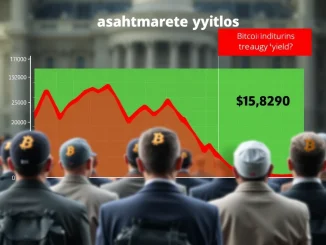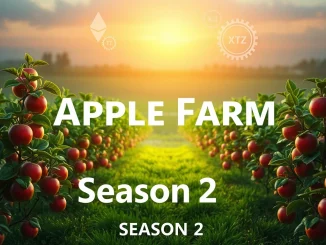
Exciting news is brewing in the world of finance and technology! If you’re an investor or simply interested in how technology is reshaping markets, pay attention to the latest reports surrounding Robinhood. The popular trading platform is reportedly exploring a significant move that could bridge traditional finance with cutting-edge technology, potentially impacting how European investors access global markets.
What’s Happening with Robinhood and US Assets Europe?
According to recent reports, specifically noted by Walter Bloomberg on X, Robinhood is reportedly in the early stages of developing a novel trading platform. The key differentiator? This platform would leverage blockchain technology to facilitate the trading of U.S. assets directly within Europe. This isn’t just about offering existing services across borders; it suggests a fundamental shift in the underlying infrastructure used for trading.
Traditionally, trading foreign assets involves complex cross-border settlements, intermediaries, and varying regulations, often leading to higher costs and slower transactions for international investors. A blockchain-based approach could potentially streamline this process significantly.
Why Blockchain Trading? Understanding the Potential Benefits
The integration of blockchain technology into a trading platform offers several potential advantages. While details on Robinhood’s specific implementation are scarce, here are some general benefits often associated with blockchain trading:
- Increased Efficiency: Blockchain can enable near real-time settlement of trades, drastically reducing the typical T+2 (trade date plus two days) settlement cycle common in traditional markets.
- Reduced Costs: By potentially cutting out some intermediaries involved in traditional cross-border transactions, fees could be lowered for both the platform and the end user.
- Enhanced Transparency: A distributed ledger can provide a clear, immutable record of transactions, increasing transparency (though privacy considerations for sensitive financial data are crucial).
- Improved Accessibility: By simplifying the infrastructure, it could make accessing U.S. markets more straightforward for European investors.
- Potential for Fractional Ownership: Depending on the design, blockchain tokens representing assets could make it easier to trade fractional shares or smaller denominations.
This move highlights a growing trend where companies are looking beyond just cryptocurrency trading and exploring how blockchain’s underlying technology can improve traditional financial services.
What Does This Mean for European Investors?
If Robinhood successfully launches a blockchain trading platform for US assets Europe, it could be a game-changer for investors on the continent. Access to U.S. stocks, ETFs, and other assets might become faster, cheaper, and more seamless. This could open up new investment opportunities and make portfolio diversification into U.S. markets more appealing.
However, it’s important to remember that this is still a reported plan. Regulatory hurdles in both the U.S. and Europe would need to be navigated. The technical implementation of a blockchain capable of handling high-volume, regulated securities trading is also a complex undertaking.
Robinhood’s Broader Trading Platform Strategy
This potential initiative aligns with Robinhood’s broader strategy of expanding its offerings and geographical reach. While known for its commission-free stock and crypto trading in the U.S., the company has been making inroads into Europe. A dedicated trading platform focused on US assets Europe, powered by blockchain, could be a strategic move to capture a significant market share by offering a unique technological advantage.
This development is worth watching closely. It signifies a potential future where the lines between traditional finance and blockchain technology continue to blur, leading to more efficient and accessible markets for investors globally.
Challenges and the Road Ahead
Building such a platform isn’t without its challenges. Regulatory compliance across multiple jurisdictions is paramount. Ensuring the security and scalability of the blockchain infrastructure will be critical. Educating users on how the new system works will also be necessary. Despite these hurdles, the reported exploration by a major player like Robinhood signals confidence in the potential of blockchain trading to revolutionize cross-border investing.
Conclusion: A Potential Leap for Cross-Border Trading
The report that Robinhood is developing a blockchain-based platform for trading US assets Europe is a significant development. It underscores the potential for blockchain technology to move beyond cryptocurrencies and fundamentally improve traditional financial processes like cross-border asset trading. For European investors, this could mean faster, cheaper, and easier access to the vast U.S. markets via a potentially revolutionary new trading platform. While challenges remain, this news highlights a promising direction for the future of global finance and technology.



